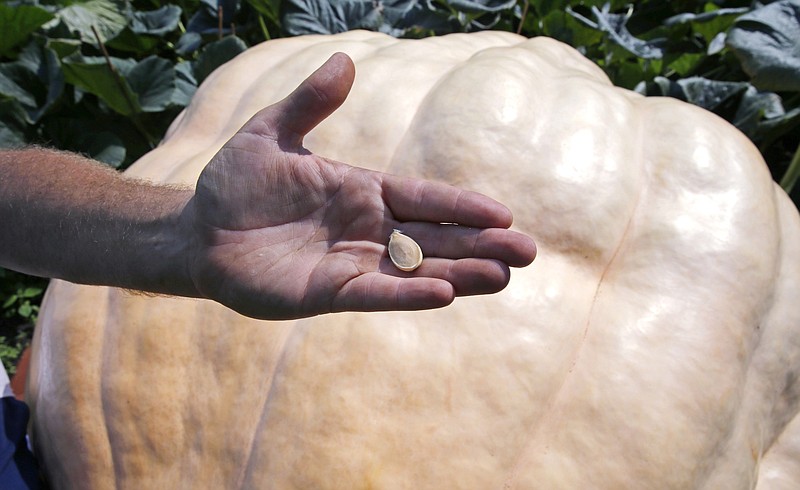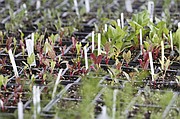Just finished planting garlic in the front-yard garden. I ordered two kinds from the seed catalog: a creamy softneck variety called Susanville, and a hardnecker, Duganski, with bulbs that are purple and eccentric. I call it "The Vegetable Formerly Known as Garlic."
Garlic is the last vegetable to be planted this year, my ninth-inning closer. What a marvel. All winter, it will stay buried, hibernating and safe, making little garlic plans to emerge sometime in the summer. Garlic is like spicy hope, dwelling all winter in quiet darkness, yet never defeated.
We have a small, ragamuffin garden. You can cover it in four strides one direction, five the other. There's a rogue pumpkin growing out of the compost pile. Gravel slung from the driveway often lands in the lettuce. Over-thrown balls from backyard football games land in the spinach. A few of the fence posts are rotting, and need to be fixed, but who has the time?
"You have a plain garden," a friend once said.
Somehow, it seemed like a compliment.
I used to have Southern Living envy; all those manicured gardens that looked like Versailles compared to mine. Yet, over time, gardening softens the heart, and in a time when so many things encourage greedy desire, gardening teaches contentedness. Be happy with what you have.
By planting and laboring over the tiniest of seeds - add water, compost, keep weeds and bad bugs away - just to hope a few rows of tomato plants grow, I've learned to bow before the larger work of others.
How far coffee has to travel to make it to my morning mug, for example.
The blessing of running water.
All the things that go into a good beer, or bowl of fresh yogurt, or switches that make the lights go on.
Once, during Lent, I spent 40 days only eating food that came from local farmers. Doing so was surprisingly spiritual. One day, I hope to make my own loaf of bread - from start (planting the wheat) to finish (dough rising in the kitchen.) Doing so will be unsurprisingly difficult.
How strange, to measure myself compared to a tiny loaf of bread. Gardening encourages this subtle inventory of self and life. How honest is my life? Can I even make a loaf of bread?
Not long ago, this most basic thought emerged out of the loam of my mind: I cannot feed my family.
Not with my own hands. Not with my own labor.
Hardly any of us can.
Sounds strange, doesn't it? And obvious.
Yet, for me, there is a starkness here: all spring, I labor over lettuce, kale and spinach. In summer, tomatoes and corn. Fall, more kale, spinach, Brussels sprouts and garlic.
Most of the time? My crops are a bust. A half-grown bust.
I do not have the knowledge, power or ability to feed myself or my family. Before the most vital and basic of needs - growing food - I am utterly unskilled.
This, I suspect, is true for most of America.
The arrangement we've agreed to is that other people make the food we eat. We've left the garden and fields for the factory and the paycheck; now, with the swipe of a credit card, we can buy more food in one grocery store trip than some families saw in entire winters.
I am not romanticizing farm life and all its laboriousness; I'm certainly not criticizing the modern miracle of mass-scale food production.
But we must ask: We have left the garden, and for what?
So what does it mean when we don't grow our own food?
How does that affect our democracy?
"A person dependent on somebody else for everything from potatoes to opinions may declare that he is a free man," writes the farmer/writer Wendell Berry, "but he will not be free. He is that variety of specialist known as a consumer, which means that he is the abject dependent of producers. How can he be free if he can do nothing for himself?"
America is full of false trails; we place so little importance on understanding food and the soil. The cheap candies of American consumer-culture lead us deep into the woods, where we find ourselves, like Hansel and Gretel, lost at the witch's door, our heads drawn to the oven.
Like garlic, we are buried.
How do our true selves - our healthy selves - emerge?
Give us this day our daily bread.
Forgive me, but I need a debit card to buy it.
Contact David Cook at dcook@timesfreepress.com or 423-757-6329. Follow him on Facebook at DavidCookTFP.

